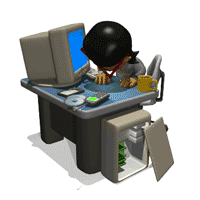Sponsored by BoysStuff.co.uk


Your computer likely cost you hundreds maybe even thousands of dollars. That's one thing that you're sure to worry about if anything happens to the computer itself. However, there's another cost that is far higher than a few hundred dollars the data that is on the computer.
Depending on the type of work that you do on your computer, whether you have a home office, or just a personal computer, the data can be priceless. From digital pictures of cherished family events to years of financial records, you could lose everything with just one hard drive failure. Sure, it'll be relatively inexpensive to replace the hard drive, but how will you replace the data that you've lost?
In fact, backing up the data on your computer is something that you should start immediately. After all, a power surge or failure could happen at any time, and this is a good way to be prepared. When you consider that 22 billion dollars will be lost due to data failure each year, having a good, solid backup seems like a good idea. Businesses that suffer severe data loss usually go out of business within the next year up to 70% of them!
Besides immediately, when should you back up your data? The answer is as often as is necessary. If you add or update a lot of data every day, then you should probably be making a small backup of that information at the end of the day, and then doing a major backup at the end of the week.
If you have a small personal computer and you do not do very much each day, then your backup schedule does not have to be as strenuous. In that case, you may only need to back up the entire computer once a month, though you should always make sure that you have an extra copy of any new files when you add them to your computer.
What types of backup materials are best for you? This depends on how large your system is, and what you intend on backing up. CD-Rs can be good for short-term, or for backing up smaller files. These are very inexpensive discs, and you can fit 700MB of data on each one. However, if you are going to be backing up larger files, then you should look into another method. DVD+R and DVD-R discs are good for backing up files up to 4.7 GB. You can also use DVDs for backups that are up to about 8GB if they are dual-layer and you have a dual-layer DVD writer.
Another popular option includes external hard drives. The benefit of these is that they are relatively quick to write to, and can be up to 500GB in size and are highly portable and efficient as a means of data storage.
Finally, you can also back up your data online if you have a high speed internet connection and can afford to purchase an online data backup service.
Depending on the type of backup you're going to make, you may need backup software. This software is designed to back up everything that you need backed up and is the ideal way to make a full system backup. Just make sure that you are close enough to switch out discs if you are saving your data to CDs or DVDs!
Do not wait until it is too late! It is very easy to save your data. Making CD or DVD backups of your most important data can be done for a few dollars and in a few minutes. This is definitely a good time investment!

| © RIYAN Productions |